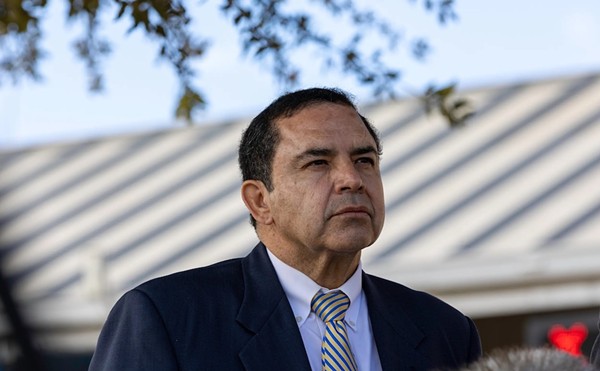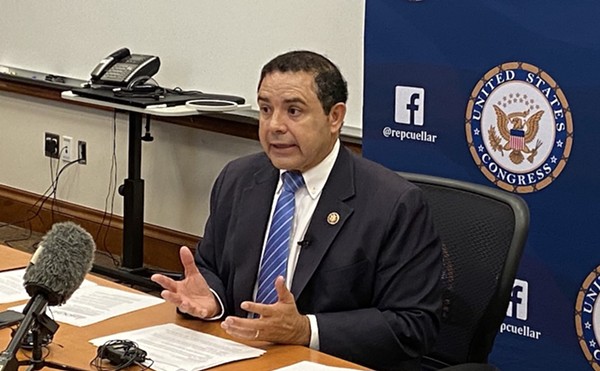When CPS Energy and their nuke partners at NRG Energy and Toshiba settled their differences in February, they also shut down, in large part, the city's broader debate about nuclear power. NRG/Toshiba took full control over pumping the federal government for needed loan guarantees for the would-be Matagorda County reactors STP 3&4. San Antonio then was able to sit back with its 7-percent share secured from the hundreds of millions it had already paid in. While SA Mayor Julián Castro has played project booster, as per the terms of the settlement agreement, the city has since been able to shift its energy attentions to less controversial efforts, including home weatherization, programmable thermostats, and solar power.
 However, CPS' hiring of Exelon Power President Doyle Beneby yesterday after a super-secret process does little to assuage the fears of the City-owned utility's many critics. (Chest bumps to the daily for their editorial on the topic, btw.)
However, CPS' hiring of Exelon Power President Doyle Beneby yesterday after a super-secret process does little to assuage the fears of the City-owned utility's many critics. (Chest bumps to the daily for their editorial on the topic, btw.)
On the surface, tapping an Exelon exec seems to communicate that CPS remains a solidly nuclear utility at the end of the day. And while the Express pounds on the table over the process, there's something else to be said about the vote: Austin just brought a sustainability expert into their utility's top spot. We appear to have gotten a well-connected old-school engineer with a lot to prove.
Exelon is the largest nuclear utility in the country, deriving 92 percent of its power from atom-splitting, and somewhat inconveniently also sent millions of gallons of tritium-contaminated wastewater into Illinois groundwater over a decade at three nukes.
Some readers may remember Exelon as the utility that filed construction permits for two new nukes outside Victoria before embarking on an ultimately unsuccessful hostile takeover of NRG Energy, instead, which would have placed the highly ranked ghost ships of STP Units 3&4 in their hands and brought a new partner to San Antonio.
Exelon Power, subsidiary of Exelon Corp., is over the non-nuke side of generation, though it specializes in selling “environmentally preferred” electricity options, a broad-brush code phrase for low-carbon emissions. In promoting nuclear power as a source of power that emits less carbon dioxide than photovoltaic solar panels, EP's sales teams enter highly dubious waters. How much carbon dioxide was emitted in the mining and refining of all those fuel rods? In the hollowing out of Yucca Mountain to possibly one day bury all those highly radioactive rods, resins, and sludges for 100,000 years or more?
And yet, Exelon Power is also the force behind sun- and earth-friendly developments like Exelon City Solar in Chicago.
The 41-acre site was rehabilitated and cleansed of toxic chemicals - and the benefits of the new solar array are manifold for city residents, Exelon CEO John Rowe and Chicago mayor Richard Daley said. Exelon City Solar, Rowe enthused, will "enhance the neighboring community by beautifying a brownfield and improving safety for local residents."
And Daley lauded the project as "a great example of the good things that happen when government and the private sector work together. " The solar array, Exelon reports, will generate 14,000 megawatt-hours of energy each year - enough to power 1,500 average homes. It will offset the emissions of 31.2 million pounds of greenhouse gas emissions each year, as well.
If Exelon City Solar is successful, more solar projects - and more green jobs - could come to Chicago. Illinois' unemployment rate, at 10.4 percent, is higher than the national average, and solar construction jobs would no doubt be welcome in the state.
Considered alongside TXU's recent free-installation solar leasing program, the Exelon endeavor shows the for-profit utilities may have a few things to teach municipally owned CPS. It's possible we have something to learn from Beneby's recent experience, or at least from mining his Rolodex.
In the past year, CPS has launched a business solar rebate program and seen nearly 100 new residential rooftop arrays go up, putting us at about 125 total. And yet the $1 million set aside for residentail solar rebates this fiscal year will likely only cover another 60 installations. If the price on solar continues to drop (as has been the trend), CPS will need to step in front of this train as it picks up speed to ensure the track is in position. Otherwise, we're looking at another jobs-displacing solar bust, like the city experienced when the utility let the rebates go dry in a squabble with City Council.
It would be hard to coax back the solar companies a second time.
Beneby's resume is a strong traditional-utility resume: two posts with Exelon (most recently overseeing coal, natural gas, and hydro generation), time inside Exelon subsidiary PECO, and 17 years in “various positions” at Florida Power & Light. But what CPS has been dying for (other than long-promised honest and open dialogue wit the public), is new utility thinking, traces of which are hard to find in Beneby's resume as it has been explained so far.
And so begins another wait-and-see.
In a prepared CPS release, Beneby said:
Service that's “reliable”; renewables that are “sensible.” It sure would have been nice to hear some of his observations on the past couple of years at CPS to see how he defines those terms in action. At least the Express got an editorial meeting with the man. The rest of the city got a lotta nada.
Smitty Smith of Public Citizen added that Austin's recent pick carries a little more green cred than what CPS reeled in. Something (if one takes into account the overwhelming message of all those public meetings last year) local residents would have demanded, given the chance.
Larry Weis, the “green” general manager from Turlock Irrigation District Austin Energy tapped, Smith writes:
Since the public was not privy to the public utility's selection process, we are left to speculate what Beneby â??s plans are. Will the vision of Mayor Castro and the legacy of Mayor Hardberger to turn San Antonio into a green city come true, or will San Antonio slip back into the nuclear spiral?
Some of us still recall the last rate increase and Mayor and CPS Board member Castro's harping on the utility's lack of transparency. We also remember the promises to do better. And yet here we are, still in the dark, wondering if better was ever an option.

















